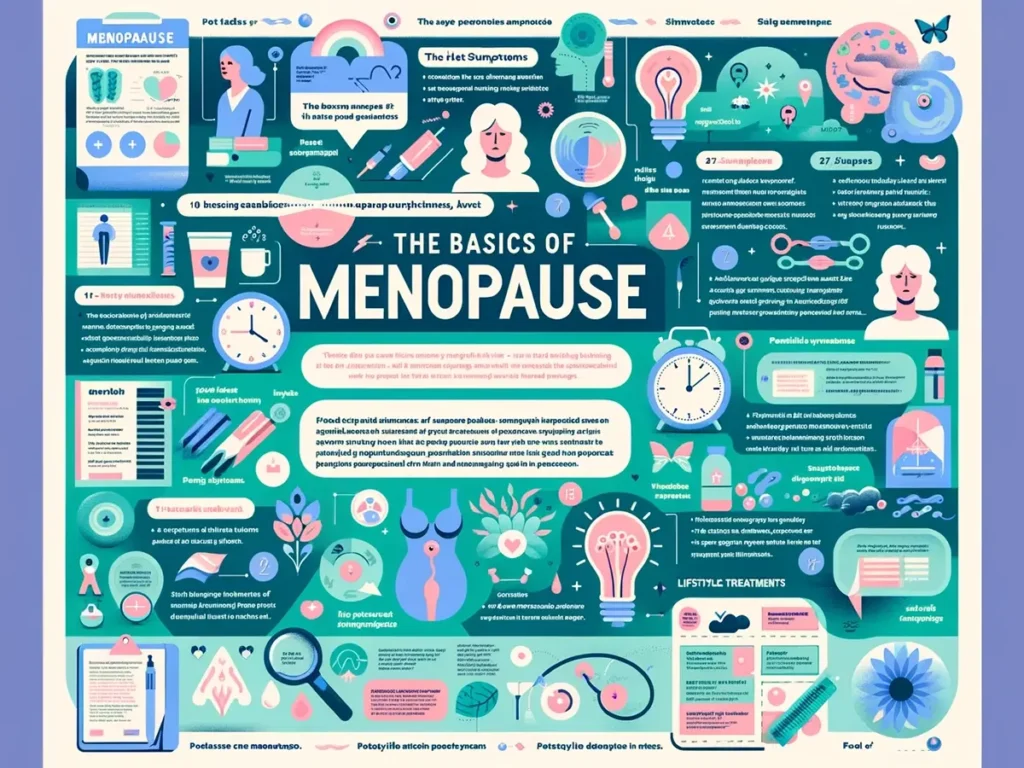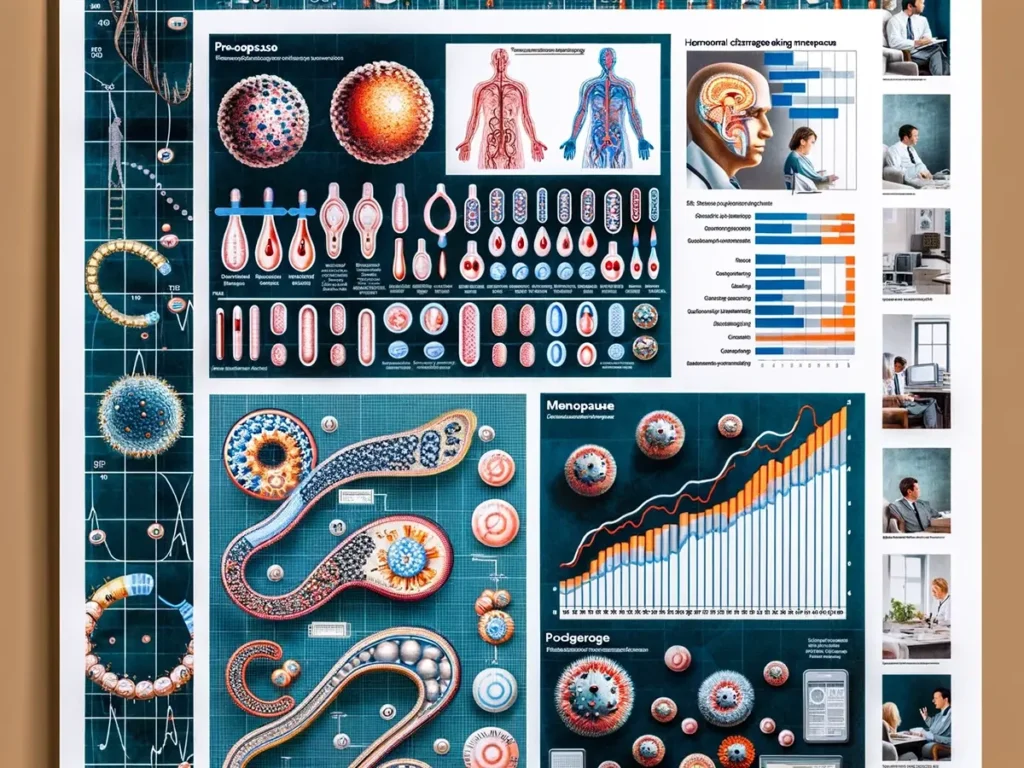Occasionally, women may experience menopause at a much younger age than the average, leading to what is known as early onset menopause. This phenomenon can pose unique challenges and concerns for those affected. In this blog post, we will delve into the facts surrounding early onset menopause, exploring its prevalence, potential causes, and the implications it may have on women’s health.
Key Takeaways:
- Early onset menopause is uncommon: While menopause typically occurs around the age of 51, early onset menopause, before the age of 40, is considered rare.
- Certain factors can increase the risk: Genetics, medical conditions, lifestyle choices, and treatments like chemotherapy can influence the likelihood of experiencing early menopause.
- Consult a healthcare provider for guidance: If you suspect you may be experiencing early menopause, it’s crucial to seek advice from a healthcare professional to determine the underlying cause and explore potential treatment options.
Defining Early Onset Menopause
The onset of menopause is a natural biological process that marks the end of a woman’s reproductive years. Early-onset menopause, also known as premature menopause, occurs when this transition happens before the age of 40. Understanding the criteria and distinctions associated with early menopause is essential to effectively addressing the potential impact on women’s health.
Age Range and Criteria
Criteria for diagnosing early-onset menopause typically involve the cessation of menstrual periods before the age of 40. Along with the absence of periods, symptoms such as hot flashes, night sweats, mood swings, and vaginal dryness may also be present. A medical evaluation, including hormone level testing, is usually conducted to confirm the onset of early menopause.
While the average age of natural menopause in women is around 51, experiencing menopause before the age of 40 is considered early onset. Women who undergo early menopause may face an increased risk of certain health conditions, including osteoporosis and heart disease, due to the decreased production of estrogen at a younger age.
Distinction from Premature Ovarian Failure
On occasion, early-onset menopause is confused with premature ovarian failure (POF). POF occurs when ovaries stop functioning before the age of 40, leading to infertility and hormonal imbalances. It’s essential to differentiate between early menopause and POF, as the treatment approach can vary based on the underlying cause.
This distinction is crucial because while early onset menopause is a natural ageing process, premature ovarian failure is a result of ovarian dysfunction. Understanding the differences between these conditions can help healthcare providers tailor treatment plans and support options effectively for women experiencing early menopause or POF.
Prevalence of Early Onset Menopause
Some women may experience early onset menopause, a condition where menopause occurs before the age of 40. This phenomenon, also known as premature menopause, can have significant impacts on a woman’s reproductive health and overall well-being.
Statistical Overview
An estimated 1% of women worldwide experience early onset menopause. This translates to roughly 1 in every 100 women facing menopause, much earlier than the average age of 51. While the prevalence may seem relatively low, the impact of early-onset menopause on a woman’s life can be profound.
Studies have shown that early-onset menopause can be linked to various factors such as genetic predisposition, autoimmune diseases, and specific medical treatments like chemotherapy. Understanding the statistical overview of early onset menopause can help healthcare providers better support women who may be at risk.
Comparisons to Average Onset Age
To illustrate the differences between early onset menopause and the average onset age, the table below provides a comparison of the two scenarios:
| Early Onset Menopause | Average Onset Age (around 51) |
| Menopause before 40 | Menopause around 51 |
| 1% of women affected | Majority of women affected |
Comparisons to the average onset age highlight the significance of early onset menopause and the impact it can have on a woman’s fertility, hormonal balance, and overall health. Women experiencing early menopause may face unique challenges that require tailored medical interventions and emotional support.
| Early Onset Menopause | Average Onset Age (around 51) |
| Higher risk of infertility | Lower risk of infertility |
| Increased risk of osteoporosis | Gradual decline in estrogen levels |
Causes and Risk Factors
For individuals experiencing early onset menopause, there are a variety of causes and risk factors that contribute to this condition. Understanding these factors can help explain why some women enter menopause earlier than others.
Genetic Influences
On a genetic level, early-onset menopause can sometimes be attributed to familial tendencies. If a woman’s mother or sister experiences menopause at a young age, there may be a genetic predisposition at play. Certain genetic mutations can also impact the timing of menopause, causing it to occur earlier than usual.
It is important to note that genetic influences are just one piece of the puzzle regarding early onset menopause. While they can play a significant role, they are not the sole determining factor in this complex condition.
Lifestyle and Environmental Factors
Causes such as smoking, exposure to toxins, poor diet, and excessive stress can all contribute to early onset menopause. Women who smoke, for example, may experience menopause earlier than non-smokers due to the harmful effects of nicotine on reproductive health.
- Any lifestyle choices that negatively impact overall health can potentially accelerate the onset of menopause.
Factors like obesity and lack of exercise can also increase the likelihood of early menopause, as these lifestyle choices can have a direct impact on hormonal balance and reproductive function.
Medical Treatments and Surgical Interventions
On the medical front, certain treatments, such as chemotherapy or radiation therapy, can induce early menopause in women. Surgical interventions like the removal of the ovaries (oophorectomy) can also trigger menopause symptoms, regardless of age.
For instance, women who undergo treatment for conditions like cancer may face early menopause as a side effect of their therapy. Healthcare providers must discuss these potential repercussions with patients before starting treatment.
Other Contributing Conditions
Contributing conditions such as autoimmune disorders, thyroid issues, and chromosomal abnormalities can also be linked to early-onset menopause. These underlying health concerns can impact hormone levels and disrupt the normal functioning of the reproductive system.
It is essential to recognize that early-onset menopause is a multifaceted issue with various underlying causes. Healthcare providers can better support women facing this challenging condition by addressing these factors and understanding their impact.
Symptoms and Diagnosis
Despite being a relatively rare occurrence, early-onset menopause can have a significant impact on a woman’s life. Recognizing the symptoms and getting a proper diagnosis are crucial steps in managing the condition effectively.
Recognizing Early Signs
To effectively manage early onset menopause, it is essential to recognize the early signs. Some common symptoms include irregular periods, hot flashes, night sweats, mood swings, and vaginal dryness. These symptoms can often be mistaken for other conditions, so it is important to consult a healthcare provider for a proper evaluation.
Furthermore, women experiencing early-onset menopause may also notice changes in their libido, sleep patterns, and overall energy levels. Tracking these symptoms and discussing them with a healthcare provider can help in early detection and timely management of the condition.
Diagnostic Procedures and Tests
Any suspicion of early-onset menopause should prompt further diagnostic procedures and tests to confirm the diagnosis. Blood tests to measure levels of reproductive hormones such as follicle-stimulating hormone (FSH) and estrogen can help determine if menopause is occurring earlier than expected. Additionally, a pelvic ultrasound may be performed to evaluate the condition of the ovaries.
Diagnostic procedures and tests for early onset menopause can provide valuable insights into a woman’s reproductive health and help in developing a suitable treatment plan. Early detection through these tests can enable women to make informed decisions about their health and well-being.
Implications and Health Effects
Short-Term Health Considerations
Noticing the onset of menopause at an early age can bring about various short-term health considerations. Women experiencing early menopause may struggle with symptoms such as hot flashes, night sweats, mood swings, and irregular periods. These sudden changes can impact daily life and may require medical intervention to manage effectively.
For some women, the early onset of menopause can also lead to a higher risk of bone density loss and osteoporosis due to decreased estrogen levels. It is crucial for individuals experiencing early menopause to work closely with healthcare providers to monitor their bone health and consider appropriate interventions to reduce the risk of fractures and other related complications.
Long-Term Health Risks
To understand the implications of early onset menopause on long-term health, it is essential to consider the increased risk of cardiovascular disease and earlier onset of age-related conditions. Research suggests that women who experience early menopause may have a higher likelihood of developing heart disease, stroke, and cognitive decline compared to those who enter menopause at a later age.
Risks associated with long-term health effects of early menopause also include an elevated risk of certain cancers, such as breast and ovarian cancer. It is vital for women who undergo early menopause to undergo regular screenings and evaluations to detect any potential health concerns early on and seek appropriate medical guidance.
Psychological and Emotional Impact
To delve into the psychological and emotional impact of early onset menopause, it is crucial to recognize the potential challenges individuals may face. Women experiencing early menopause may go through feelings of grief, loss, and a sense of inadequacy due to the unexpected changes in their reproductive health. This emotional burden can significantly impact mental well-being and overall quality of life.
For instance, early menopause can also affect a woman’s self-esteem and body image, leading to feelings of isolation, anxiety, and depression. Individuals need to seek support from healthcare professionals, therapists, or support groups to navigate these emotional challenges effectively and maintain mental resilience during this transitional phase.
Managing Early Onset Menopause
Now that you have been diagnosed with early-onset menopause, it is important to understand that managing the symptoms and effects of this condition is crucial for your well-being. Several approaches can help you navigate through this stage of life with more ease and comfort.
Hormone Replacement Therapy (HRT)
An effective treatment option for managing the symptoms of early-onset menopause is hormone replacement therapy (HRT). This method involves supplementing the hormones your body is no longer producing enough, such as estrogen and progesterone. HRT can help alleviate hot flashes, night sweats, vaginal dryness, and other menopausal symptoms, improving your quality of life significantly.
It is essential to consult with your healthcare provider before starting HRT, as they can provide personalized recommendations based on your medical history and individual needs. HRT is available in various forms, including pills, patches, creams, and even vaginal rings, allowing you to choose the option that suits you best.
Alternative Treatments and Lifestyle Changes
Alternative treatments and lifestyle changes can also support the management of early-onset menopause. These may include dietary adjustments, regular exercise, stress-reducing techniques like yoga or meditation, and incorporating natural supplements like black cohosh or soy isoflavones into your routine. These approaches can complement traditional treatments and improve your overall well-being during this transitional phase.
The key is to explore different options and find what works best for you. Remember that what may work for one person may not work for another, so it’s essential to consult with your healthcare provider to create a comprehensive and personalized management plan for your early onset menopause.
Coping Strategies and Support Networks
Developing coping strategies and seeking support from networks of individuals who understand and can relate to what you are going through is crucial. Coping with early onset menopause can be challenging, both physically and emotionally, but having a solid support system in place can make a significant difference in how you navigate this phase of your life.
Networks of support can include family, friends, support groups, online forums, or even therapy sessions with a mental health professional who specializes in menopausal issues. These resources can provide you with the understanding, empathy, and guidance you need to cope effectively with the changes and challenges that early onset menopause may bring.
Ongoing Research and Developments
Advances in Understanding Early Onset Menopause
Research developments have contributed to a better understanding of early-onset menopause, shedding light on the complex factors that can lead to this condition. Studies have identified genetic predispositions, autoimmune disorders, and environmental factors as potential contributors to early menopause. By delving into the underlying mechanisms at play, researchers uncover new insights that could pave the way for more targeted treatment approaches.
Furthermore, advancements in technology and methodologies have allowed for more precise measurements and analyses of hormonal changes associated with early menopause. This has enabled researchers to detect subtle variations in hormone levels that were previously overlooked, providing a more comprehensive view of the hormonal imbalances characteristic of early-onset menopause.
Future Directions for Treatment and Management
Future research in early-onset menopause is poised to focus on developing personalized treatment strategies tailored to individual genetic profiles and health conditions. By leveraging cutting-edge genetic testing and data analysis techniques, healthcare providers may soon be able to offer more effective interventions that address each patient’s specific underlying causes of early menopause.
Understanding the intricate interplay between genetics, lifestyle factors, and hormonal fluctuations will be crucial in advancing early-onset menopause research. By identifying key biomarkers and predictive indicators, researchers hope to revolutionize the way we diagnose, treat, and manage this condition, ultimately improving outcomes for women facing early menopause.
Summing up
Conclusively, early onset menopause is not as rare as previously thought, affecting around 1% of women under the age of 40. This condition can have significant physical, emotional, and reproductive consequences for women, so it is important for healthcare providers to be aware of the signs and symptoms of early menopause in order to provide the appropriate support and treatment for affected individuals.
FAQ
Q: What is early onset menopause?
A: Early onset menopause, also known as premature menopause, occurs when a woman experiences menopause before the age of 40. This can be caused by various factors such as genetics, autoimmune diseases, or certain medical treatments.
Q: Is early onset menopause a rare occurrence?
A: Early onset menopause is considered rare, affecting about 1% of women. While it may not be common, it is a significant health concern that can have physical and emotional impacts on women’s overall well-being.
Q: What are the symptoms of early onset menopause?
A: Symptoms of early onset menopause are similar to those of menopause at a later age and can include hot flashes, night sweats, irregular periods, mood changes, vaginal dryness, and decreased libido.
Q: How is early onset menopause diagnosed?
A: Early onset menopause is diagnosed based on symptoms, medical history, and blood tests to measure hormone levels such as follicle-stimulating hormone (FSH) and estradiol. A healthcare provider may conduct additional tests to rule out other possible causes.
Q: What are the treatment options for early onset menopause?
A: Treatment for early-onset menopause may include hormone replacement therapy (HRT) to alleviate symptoms and reduce the risk of long-term health complications such as osteoporosis. Lifestyle changes, dietary modifications, and emotional support are essential components of managing early-onset menopause.






